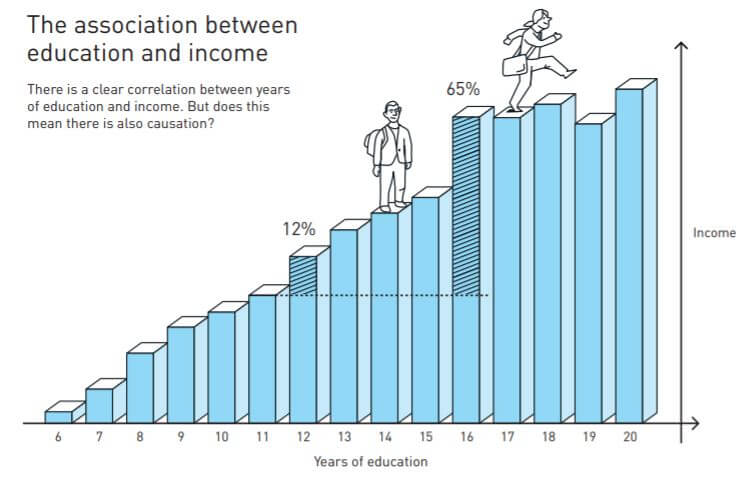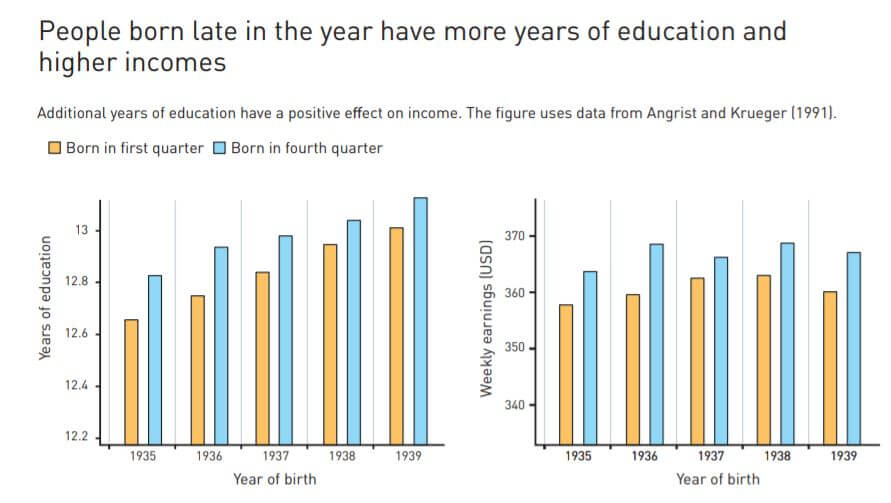Prof. Angrist previously taught at the Hebrew University * Natural experiments help answer important questions for society. for example: People born in the fourth quarter of the school year have more years of education and higher income
Nobel Prize in Economics for 2021
The Nobel Prize in Economics for 2021 was awarded to three researchers: half of it was given to David Card (David Card) from the University of California, Berkeley, USA for his "empirical contributions to employment economics" and the second half jointly with two researchers: Yehoshua Angrist (Joshua D. Angrist) from the Massachusetts Institute of Technology, USA and Guido Imbanes (Guido W. Imbens) from Sanford University, USA for "the methodological contributions to the examination of causal relationships".
Natural experiments help answer important questions for society
This year's Nobel laureates - David Card, Joshua Angrist and Guido Imbens - provided us with new insights into the labor market and demonstrated to us what conclusions can be drawn from natural experiments regarding causality - cause-effect relationships between events. Their approach extended to other fields and gave rise to a breakthrough in empirical research.
Many of the most important questions in the social sciences deal with cause and effect. How does immigration affect wage and employment levels? How does higher education affect the learner's future income? It is difficult to answer these questions since we have nothing to compare. We do not know what would have happened if there had been lower immigration or if the person had not continued to study for a higher degree.
However, this year's Nobel laureates have shown us that these and similar questions can be answered with their help natural experiments. The key is to use situations where events or policy changes cause different groups of people to be treated differently, similar to clinical trials in medicine.
with the help of natural experiments, David Card Examine the effects of the labor market on the minimum wage, on immigration and on education. His research from the beginning of the nineties of the last century challenged the accepted paradigm in the field, and eventually led to new analyzes and additional insights. The findings of his research showed that, among other results, raising the minimum wage does not necessarily lead to a reduction in the number of jobs. Today we know that new immigration can contribute to the income level of people born in a certain country, while people who immigrated in earlier and more troubled times are negatively affected by it. It also turned out that the resources provided in the schools are much more important for the student's future success in the labor market than was accepted in the past.
At the same time, it is difficult to interpret the data obtained from natural experiments. For example, extending compulsory education by one more year for students (but not for another group) will not affect every student in that group in the same way. Some students would continue to study anyway, and for them, the value of education is not, usually, representative of the group as a whole.
Therefore, is it even possible to draw any conclusion regarding the effect of an additional year of study at school? in the mid-nineties, Joshua Angrist also Guido Imbanes Solve this methodological problem while demonstrating how accurate inferences about causality (cause and effect) can be drawn from natural experiments.
"Card's research on the core questions for society and Angrist and Imbens' methodological contributions have shown that natural experiments are a rich source of knowledge. Their research has significantly improved our ability to answer key questions, questions that provide great benefit to human society," said Peter Fredrickson, Chairman of the Prize Committee in Economic Sciences.
One example of a natural experiment
Let's use a practical example to demonstrate how a natural experiment works. One of the questions concerning both society and young people regarding their future is how much more you will earn if you choose to study more. An initial attempt to answer this question may be in analyzing data regarding the relationship between a person's level of earnings and his level of education. In any valid context, people with more years of education will have higher income. For example, for a person born in the USA during the XNUMXs, the income was, on average, seven cents higher for those who had an additional year of education.
The relationship between education and income

There is a clear relationship between the years of education and the level of income. However, does this mean that there is also a causality between these two factors?
That is, can it be concluded that one more year of education adds seven cents to your income? The answer to this question is no - people who choose a longer education are different in many ways from those who choose a shorter education. For example, some people can be talented in study and work. It is likely that these people will continue their studies, but they will probably have a high income even if they did not continue studying. It is also possible that only people who expect their education to be financially rewarding will choose to study longer.
Similar problems also occur when one wants to examine how income affects longevity. The data shows that people with higher income live longer - but is it really because of their higher income or because these people have other characteristics that allow them to achieve higher income and longevity? It is easy to think of other examples in which it is possible to doubt whether the dependence between the factors actually implies a real causal relationship.
So, how can a natural experiment be used to test whether additional years of education affect the level of future income? Joshua Angrist And his colleagues showed how this can be done in an article that was a milestone in the field. In the US, children can leave school when they reach the age of 16 or 17, depending on the country where they study. In light of the fact that all children born in a certain calendar year begin their studies at school on the same date, children born early in that year can leave school before children born at the end of the year. When the researchers compared people born in the first quarter of the school year to those born in the fourth quarter, they saw that the first group (the first quarter) spent, on average, a shorter time in school. People born in the first quarter also had lower incomes than those born in the fourth quarter. Therefore, as adults they had a shorter education and a lower income than those born at the end of the year.
Since randomness determines exactly when a person is born, the researchers were able to use this natural experiment to establish a causal relationship showing that Higher education leads to higher income: The degree of impact of an additional year of education on the level of income was equal to nine cents. It was surprising that this effect was stronger than the relationship between education and income, which was equal to only seven cents. If ambitious and intelligent people had high levels of both education and income (regardless of the level of education) then the result should have been the opposite; Dependence should have been stronger than causation. This observation raised new questions as to how the results of natural experiments should be interpreted - questions that were later answered by Joshua Angrist and Guido Imbens.
People born in the fourth quarter of the school year have more years of education and higher income

It would be easy to believe that situations that allow natural experiments are extremely rare, especially those that allow important questions to be answered. Studies conducted over the past thirty years have shown that this is not the case: natural experiments occur frequently. For example, they may occur as a result of policy changes in certain parts of the country, reductions in tuition fees in institutions of higher education, or income tests for income tax payments and compensation systems, which mean that some people are exposed to interference while others, similar to them, are not exposed to such interference. Thus, there is an unintended randomization that divides the people into a control group and a test group, a fact that provides researchers with opportunities to uncover causal relationships.
The Hebrew University congratulates Prof. Joshua Ingrist, former faculty member in the Department of Economics, for his win in the Nobel Prize for Economics
Prof. Engrist was a graduate student and faculty member, taught at the Hebrew University during the 90s and even visits it as a visiting researcher for many years. He won the award together with Prof. Guido Ambens for their methodological contribution to the analysis of causal relationships and together with Prof. David Carr
The Hebrew University congratulates Prof. Joshua Ingrist for winning the Nobel Prize in Economics for 2021. Ingrist studied part of his master's degree at the Hebrew University during the 80s and in the 90s was a faculty member in the Department of Economics. In 2004 he returned to the Hebrew University as a research fellow for a year.
Prof. Asher Cohen, President of the Hebrew University, congratulated Prof. Ingrist: "We congratulate Prof. Ingrist for winning the most prestigious award in the world of science in the field of economics. For several years he was a faculty member in the Department of Economics. This win is also evidence of our being a leading academic university in Israel and the world. This is an honor for the Hebrew University in particular, for the Israeli academy in general and a great privilege for the students who were privileged to study with him"
Prof. Victor Lavie, a colleague of Prof. Ingrist from the Department of Economics at the Hebrew University and a close personal friend, also congratulated: "Joshua Ingrist is a loyal friend to the State of Israel and the Hebrew University. He invests a considerable part of his time in research on issues related to education and economy in Israel. Josh has been my personal research partner for decades and a close personal friend. I am very happy for him and proud of him for his amazing achievement."
More of the topic in Hayadan:

One response
Sorry but I didn't understand anything.
Are these global or local conclusions?
Birth in the fourth quarter leads to a higher income in the US or in the whole (Western?) world.
How do you know which of the factors had the dominant effect on the result?